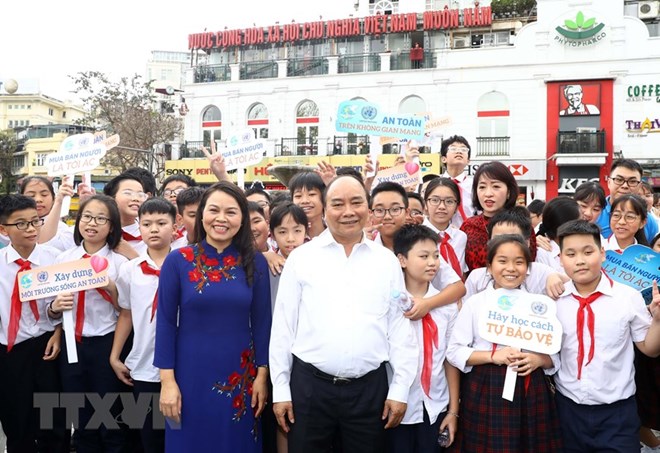Prime Minister directs ensuring safety for women, children

Prime Minister Nguyen Xuan Phuc at the event (Source: VNA)
Prime Minister Nguyen Xuan Phuc has affirmed the Vietnamese Party and State’s consistent policy of ensuring rights of people, including women and children.
He made the statement during a teleconference held by the Vietnam Women’s Union (VWU)’s Central Committee in Hanoi and Ho Chi Minh City on March 6 to launch “The Safety Year for Women and Children”, contributing to the national action plan for the United Nations (UN) Agenda for Sustainable Development 2030.
The PM said legal regulations on gender equality, domestic violence prevention, health care, education, rights protection, and women empowerment have been refined.
The State has provided free health insurance for children aged below 6 while nearly all children benefited from the expanded vaccination programme, nearly all those aged 5 attended preschools, and about 90 percent of children living in difficulties enjoyed social support.
He lauded the VWU for raising public awareness of gender equality and the importance of ensuring safety for women and children in the fulfillment of sustainable development goals.
Ministries, agencies, mass organisations and localities were asked to review action plans, propose regulations and policies on social safety and welfare for children and women, seriously punish violations affecting their lives, health and dignity.
VWU Central Committee Chairwoman Nguyen Thi Thu Ha said 61 women and seven children suffered domestic violence and three children were victims of sexual abuse each day during 2012-2015.
UN Resident Coordinator in Vietnam Kamal Malhotra said discrimination and violence against women and children, especially girls, are the most popular violation of human rights in the world, which is also the least prosecuted crime.
This year, the VWU Central Committee will take specific actions at the local and central levels such as holding communication campaigns on safety for women and children on television and radio stations, issuing publications, organising conferences and dialogues with ministries, agencies and localities, reviewing and proposing legal regulations, holding capacity training for female officers and those involved in the work.
On the occasion, two photo exhibitions on the theme were also launched together in the two cities, together with a display of safe farm produce and consultancy on health care and laws for women and children.
VNA
 NA Standing Committee to convene 39th session
NA Standing Committee to convene 39th session
 Focal dirctive and leadership set for success of all-level Party congresses
Focal dirctive and leadership set for success of all-level Party congresses
 Preparations for all-level Party congresses ensure progress under provincial Party Standing Committee's plan
Preparations for all-level Party congresses ensure progress under provincial Party Standing Committee's plan
 Province's development achievements come from the strength of unity...
Province's development achievements come from the strength of unity...
 Prime Minister chairs Government’s regular meeting
Prime Minister chairs Government’s regular meeting
 PM urges stronger Vietnam - China cultural, tourism links
PM urges stronger Vietnam - China cultural, tourism links
 In seeking for measures to match CPV guidelines and public inspiration
In seeking for measures to match CPV guidelines and public inspiration
 In 2025, province prioritizes capital allocation for key projects
In 2025, province prioritizes capital allocation for key projects
 Vietnam participates in efforts on sustainable management, exploitation of critical minerals: Ambassador
Vietnam participates in efforts on sustainable management, exploitation of critical minerals: Ambassador
 Vietnam commits to promoting ACMECS cooperation
Vietnam commits to promoting ACMECS cooperation



